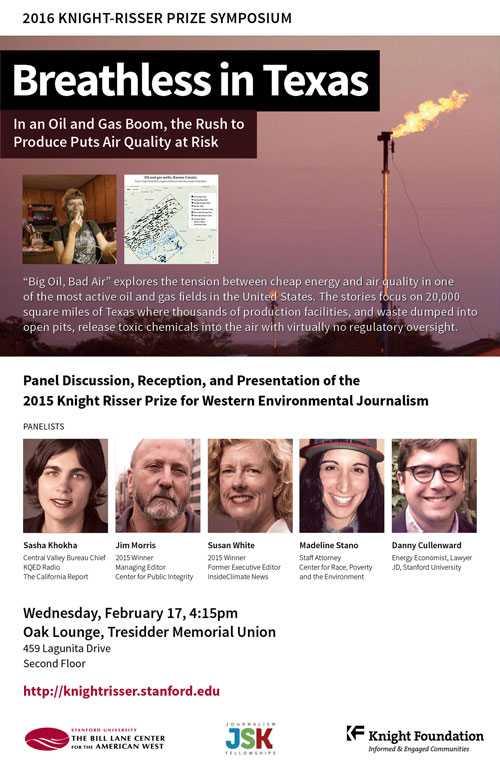
The Bill Lane Center for the American West, Stanford University
2016 Knight-Risser Prize Symposium
‘Big Oil, Bad Air’ — 50 Years After the Clean Air Act, Pollution Problems Persist
By Robin Evans
JSK Journalism Fellowships
February 25, 2016
Trouble breathing, recurring nosebleeds, nausea, headaches. These are the common complaints of adults and children in California, Texas and other states who live near active oil wells and natural gas fracking sites.
But it’s a hard to prove a link. Toxics monitoring is slim to none in some of these areas. Scientists can do little with only anecdotal information. Regulators are often reluctant to pressure the industry, and there is little political will – local to state – to remedy the situation.
That’s the conclusion of an environmental attorney, an energy economist and two longtime environmental journalists who discussed the legacy of the 1963 Clean Air Act at the Knight-Risser Prize Symposium at Stanford.
The symposium honors the winner of the Knight-Risser Prize for Western Environmental Journalism. This year it was “Big Oil, Bad Air,” a joint reporting project by the Center for Public Integrity, InsideClimate News and The Weather Channel. The 18-month project focused on the impact on air quality in one of the most active oil and gas fields in the United States, the Eagle Ford Shale of south Texas.
Watch the Complete Video of the Symposium and Panel (Story continues below)
Participants in the discussion:
- Moderator Sasha Khokha, Central Valley Bureau Chief for KQED News;
- Madeline Stano, staff attorney at the Center for Race, Poverty and the Environment;
- Danny Cullenward, energy economist and climate policy expert, JD Stanford University;
- Susan White, former InsideClimate News executive editor who will be launching the investigative site InquireFirst;
- Jim Morris, managing editor of the Center for Public Integrity.
White and Morris are among the five-member team that produced a documentary and some 40 stories. Other contributers included Lisa Song and David Hasemyer of InsideClimate News and Greg Gilderman of The Weather Channel.
James V. Risser, for whom the prize is named, presented the winners' plaques to White and Morris, as well as Jessica Garrison, a writer for BuzzFeed. Her story “Warehouse Empire,” on the mega-shipping warehouses overwhelming communities in Moreno Valley east of Los Angeles, won a Special Citation.

As Clean Air Act Falters, a Need for Regulations?
Symposium panelists stressed the need for more not fewer regulations as a burgeoning energy industry and a warming climate collide. But they had little faith in the federal Clean Air Act to make a difference.
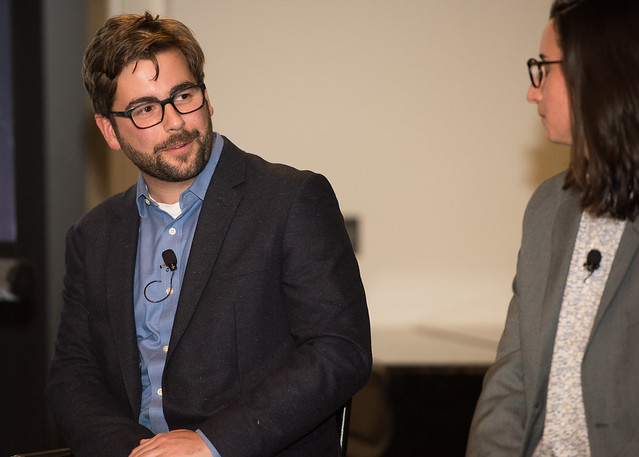
Danny Cullenward, an energy economist and lawyer.
Steve Castillo
“Their stories showed that regulators are not really interested in changing things,” said Cullenward, a lawyer and economist specializing in energy policy who has criticized what he characterizes as backtracking on environmental regulation. “The Clean Air Act has done lots of good, but maybe it’s not the best tool with new technologies like fracking – since the law is so old.”
The key weakness in the federal law, said Morris, is that enforcement is entrusted to state governments. “Big Oil, Bad Air” showed that in Texas at least, a state where the oil industry is the economy, the law is lucky to be alive. Despite a 100 percent increase in toxic air releases since 2009, the legislature has cut the state’s air quality board budget by a third and dropped the amount allocated for air monitoring equipment. Texas has sued the U.S. Environmental Protection Agency 18 times in the last decade.
“You’d think the EPA would step in in Texas, but that couldn’t be further from the truth,” Morris said.
A Lack of Data – and of Interest in Collecting It
The team’s investigation revealed that the 20,000-square-mile Eagle Ford Shale has only five air monitors. The thousands of facilities exploiting oil and gas deposits there are allowed to self-monitor. Companies are rarely fined for violations.
Morris described Texas regulatory officials as mostly evasive and unresponsive to journalists, or residents. Many later go to work for the industry. Regulators on elected regulatory commissions rely heavily on industry campaign donations. The Texas air quality board is led by three commissioners appointed by then-Gov. Rick Perry, who favored dismantling the EPA and was skeptical of climate change.
The anti-regulatory attitude prevails as well at the local level. Morris cited a scientist who offered free monitoring to a number of mayors in small Texas towns but was routinely rebuffed.
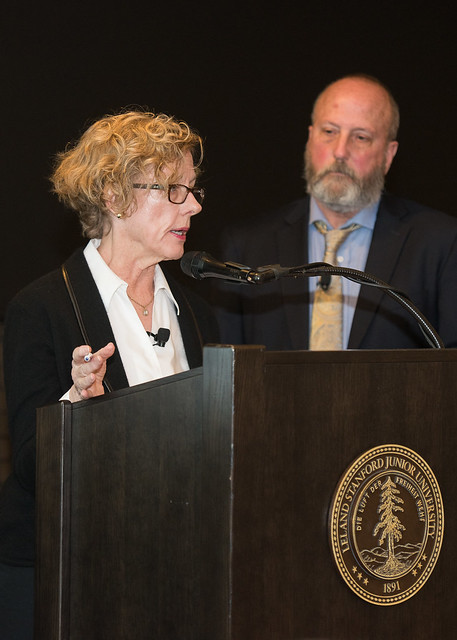
Susan White, former executive editor of InsideClimate News, with Jim Morris giving acceptance remarks.
Steve Castillo
White said in her years of environmental reporting experience, she has found that regulators are quick to say the public is safe when an incident occurs or complaints arise. Moreover, the science they cite is often corrupt or inapplicable to the circumstances.
“Is there science there to show it’s safe?" she said, "I’ve become so skeptical of what people tell me. In all the projects I’ve been involved in, I and my reporters desperately want good news. We’re not just out there searching for bad news. It’s a major problem and people should be skeptical across the country when they’re told it’s safe.”
“Big Oil” wasn’t able to pin down the science but found a scientist who said the sheer number of complaints is “something to be very worried about, something that deserves and demands more research,” she said.
And they found person after person with “stories that were so vivid,” said Morris. “Do they think 200 people from this huge area are conspiring?’
California Family Seeks Legal Remedy
Panelists were also skeptical that litigation can do much to change the situation. Still, with few other options, people like Stano and organizations like the Center for Race, Poverty and the Environment are giving it a go. She and CPRE are representing a Kern County family whose lawsuit against Gov. Jerry Brown contends that California's new fracking regulations do not protect the health of public school children, and that they illegally discriminate against (predominantly Latino) children disproportionately affected by fracking in their neighborhoods.
California is one of 11 states that do not limit how closely oil and gas crews can drill to houses, schools, and churches. Statewide, Latino students are over 18 percent more likely to attend a school within a mile and a half of a stimulated well than non-Latino students, according to the suit.
In addition to the usual complaints, a 9-year-old boy at the same Shafter, Calif., school the plaintiffs’ children attend developed prostate cancer. A 12-year-old girl who had a respiratory attack went into a coma from which she never recovered.
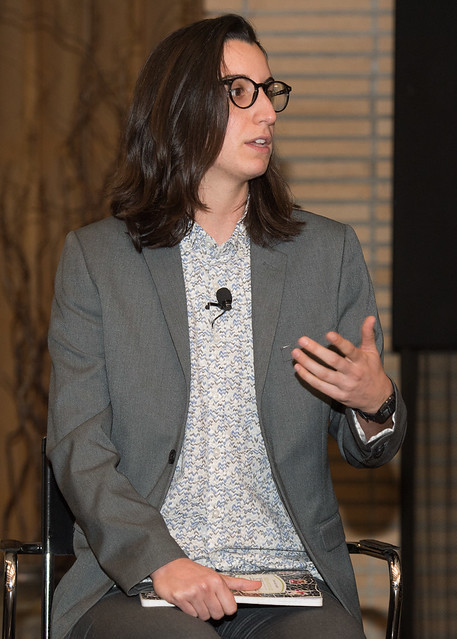
Madeline Stano, a staff attorney for the Center for Race, Poverty and the Environment.
Steve Castillo
Stano complimented the “Big Oil” team for holding regulators to account over long periods of time and across a matrix of stakeholders.
“You did a beautiful job of highlighting an issue much bigger than Eagle Ford,” she said, adding, “How do you prove an injury when there is no information from regulators in a state that has agriculture as well and can’t pinpoint which 2.5 [micrometer] particle is coming from which operator. (She’s referring to microscopic particulate matter. Anything less than 2.5 micrometers – one thousandth of a millimeter – is small enough to penetrate deep into the lungs and enter the bloodstream.)
“Their school is also near an almond farm that is among the 99th percentile of polluters,” she added.
And presence doesn’t equal risk, she said. Even if residents do get a scientist on their side, she said, “you’ve got 40 industry scientists in comparison to an extra-credit-time community scientist. Even when scientists and journalists are doing a wonderful job, we need to hold regulators’ feet to the fire.”
Vigilance is Key, Says White
Even when politicians are pushed to action, environmental watchers can’t relax, White said.
“After every one of these incidents, we all know the politicians come out and promise things. They write new legislation. Then everything disappears and everything dies down. Sometimes legislation is written and proposed but you find built-in loopholes,” she said.
“You have to be skeptical all the time. I don’t know who can do that job but journalists. Advocacy groups do good jobs – we got good tips and quotes – but you have to be able to stand back and look at the whole picture.”
Read the 2015 Knight-Risser Prize winning story, "Big Oil, Bad Air" and learn more about the winners, Jim Morris and Susan White.
Watch the Complete Video of the Symposium and Panel
About the Knight-Risser Prize Symposium
The Knight-Risser Prize Symposium seeks to forge collaborative links between environmental research, education, journalism, and policy-making to enrich and support environmental journalism and make environmental research, scholarship and teaching relevant to the real world. The prize and symposium are sponsored by the John S. Knight Journalism Fellowships and the Bill Lane Center for the American West at Stanford University, with support from the John S. and James L. Knight Foundation.
Knight-Risser Prize Symposiums:
“When the Well Runs Dry: Confronting a Groundwater Crisis” 

January 2017 Knight-Risser Prize Symposium, January 25, 2017
“Breathless in Texas: Energy Production Puts Air at Risk” 

2016 Knight-Risser Prize Symposium, February 17, 2016
“Troubled Waters: Marine Life and the Threat of Ocean Acidification” 

2015 Knight-Risser Prize Symposium, February 25, 2015
“Deadly Measures: Uncovering a Little-Known Agency's Toll on Wildlife” 

2014 Knight-Risser Prize Symposium, February 5, 2014
“Wildlife, Wired: How Technology Is Changing Nature Reporting” 

2013 Knight-Risser Prize Symposium, February 20, 2013
“Adapting to Dry Times: The Role of the Media in an Increasingly Arid West ” 

2012 Knight-Risser Prize Symposium, January 25, 2012
“The Crisis in Western Environmental Journalism” 
November 2010 Knight-Risser Prize Symposium, November 17, 2010
“Visualizing the Environment” 
January 2010 Risser Prize Symposium, January 27, 2010
“Climate Change Hits Home”
December 2008 Risser Prize Symposium, December 3, 2008
“Environmental Fallout of the Cold War” 
March 2008 Risser Prize Symposium, March 13, 2008
“Water in the West: 21st Century Challenges in a 19th Century Legal Framework” 
2005 Risser Prize Symposium, November 1, 2005
The team’s investigation revealed that the 20,000-square-mile Eagle Ford Shale has only five air monitors. The thousands of facilities exploiting oil and gas deposits there are allowed to self-monitor. Companies are rarely fined for violations.
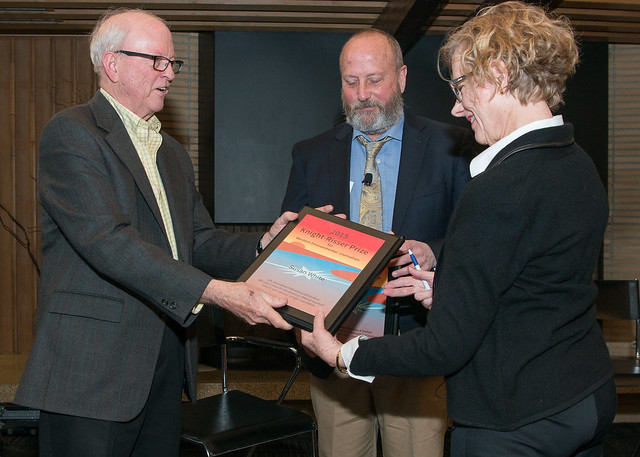
Morris and White accept the Knight-Risser Prize from James Risser, left
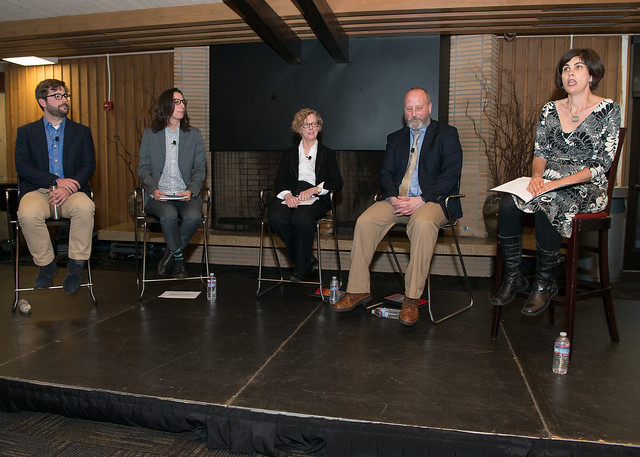
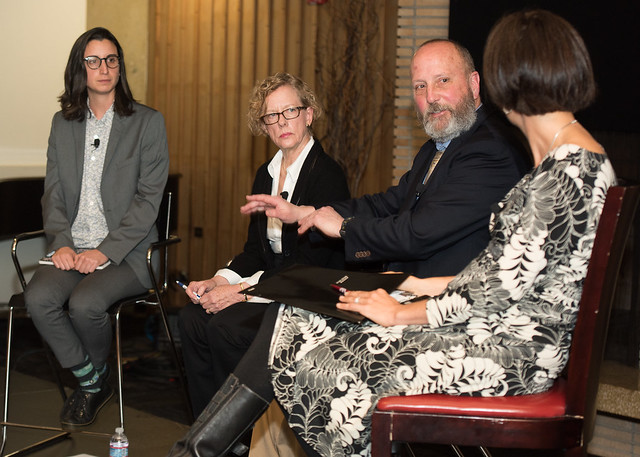
"You’d think the EPA would step in in Texas, but that couldn’t be further from the truth."
Jim Morris
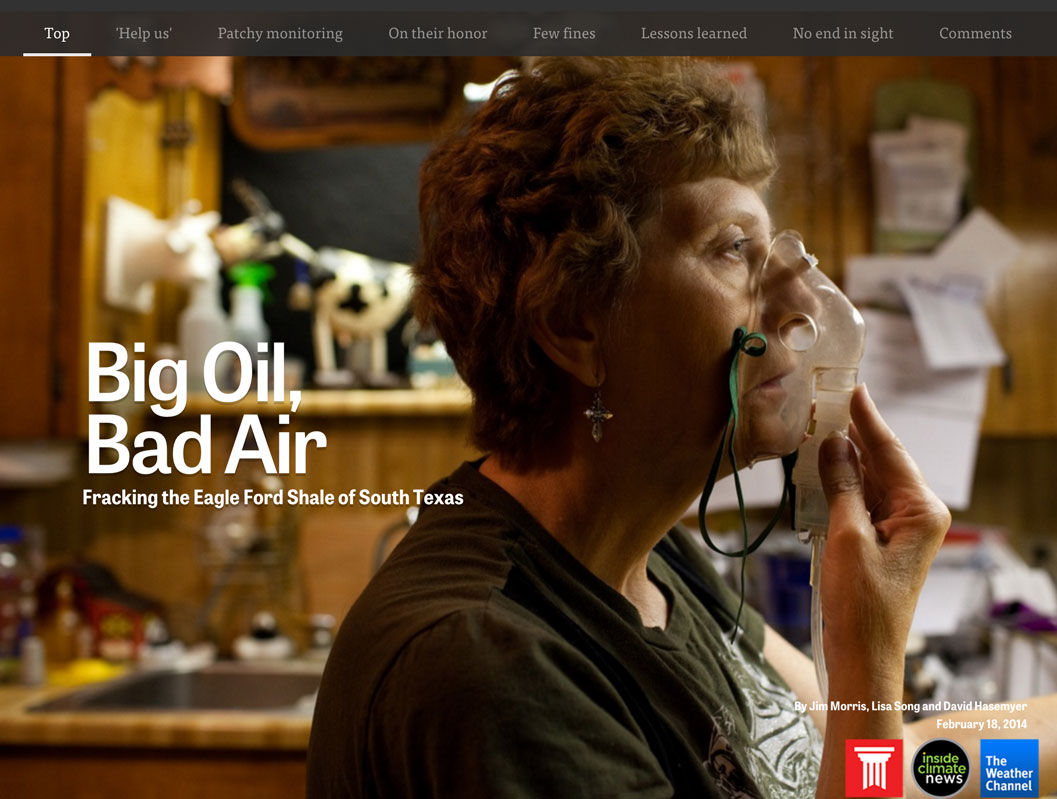
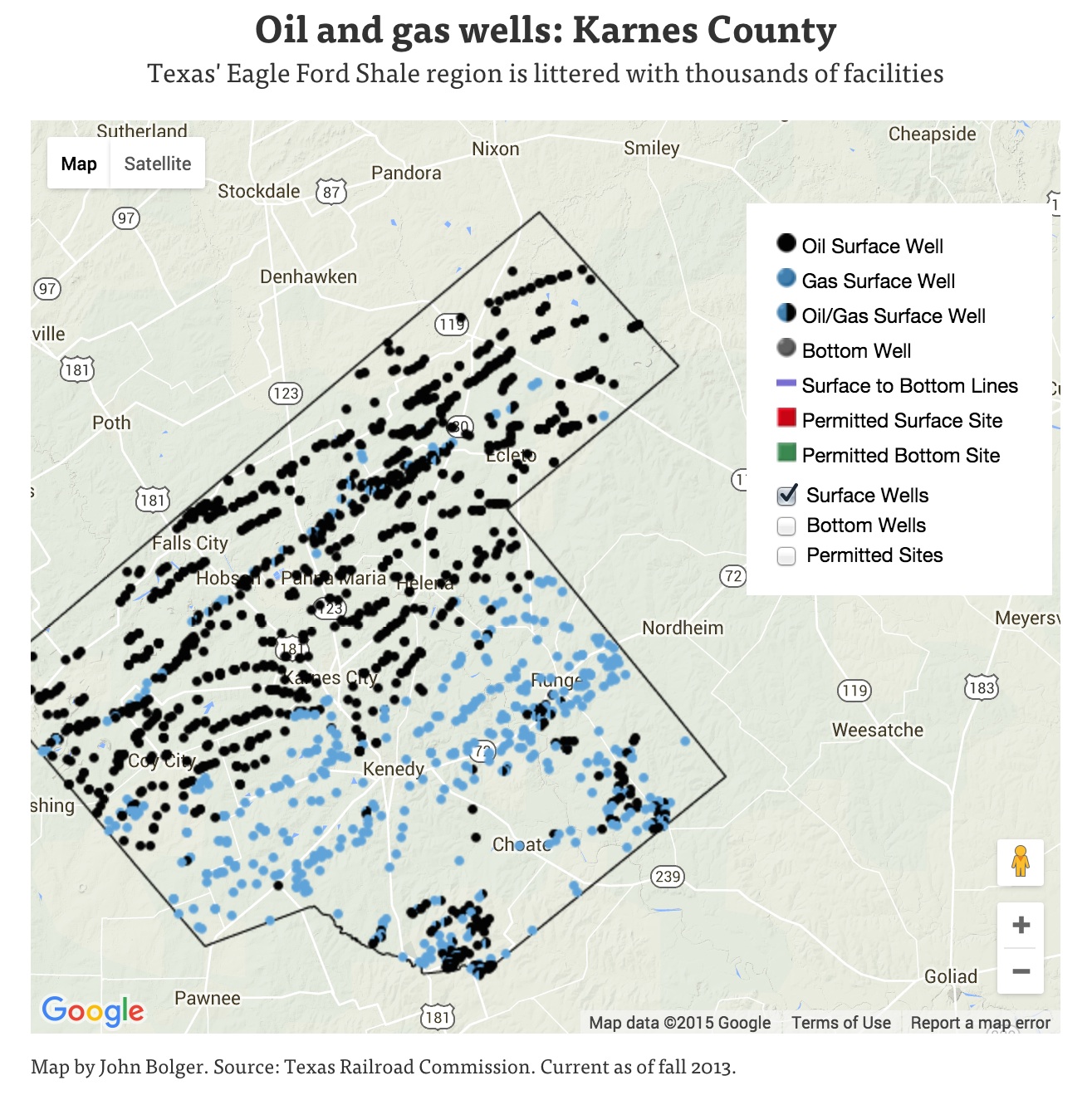
“The Clean Air Act has done lots of good, but maybe it’s not the best tool with new technologies like fracking – since the law is so old.”
Danny Cullenward
Texas Tribune, ProPublica

The Desert Sun and USA Today

CPI, InsideClimate News, The Weather Channel

The Seattle Times

The Sacramento Bee

High Country News

5280 Magazine

Seattle Post-Intelligencer

What Went Wrong?
The Seattle Times

San Antonio Express-News

The Los Angeles Times

High Country News


